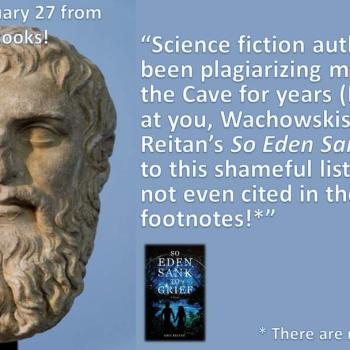I recently listened to two science fiction books with religious themes as audiobooks. One is Phillip K. Dick’s VALIS, and the other is Michel Faber’s The Book of Strange New Things. What follows in this post and the next will contain spoilers about both, but hopefully not such as will ruin anyone’s enjoyment of either. After all, neither is exactly a brand new book, and VALIS is decades old at this stage. And so I’ll proceed assuming that my role is to persuade you to read a book that you might otherwise not have, and not to report on the latest bestsellers that you’re already planning to read and are thus hoping I won’t say too much about.
The title of this blog post itself has a spoiler in it, albeit one that won’t give anything away unless one actually reads past this point. Because the strange convergence that led me to decide to blog about both books in conjunction with one another (even if I ultimately do so across two separate blog posts because of the length) is the fact that both novels raise questions about the goodness of God in response to a dead cat.
To be sure, a dead cat cannot be said to be the main focus of either novel. It just struck me as interesting that they intersect in the way they do on this one point. Both books feature the question of theodicy quite prominently, but each explores it in a very different way for the most part. Indeed, both books are very different in feel and plot, and had I not listened to them one immediately after the other, the convergence on this particular detail might not even have struck me.
VALIS is a novel that is presented as semi-autobiographical. Dick writes in the first person as himself, focusing on the strange experience and religious views of his friend Horselover Fat, who we are clued in early – and Dick himself at one point comes to accept – is in fact none other than Phillip Dick himself, but whom Dick has come to believe is a rather unhinged friend of his, in response to trauma as a coping mechanism of his own.
In other words, the story has a rather insane premise in a quite literal sense of the word.
Throughout the novel we are told that Horselover Fat had experienced being struck by a pink beam of light which he interpreted as being from God, with God perhaps being an alien entity of advanced technology. He begins writing a work he calls his Exegesis. This text mentions (and thus the novel mentions) ancient Gnosticism (in detail, including Yaldabaoth, Sammael, Sophia, the Pleroma, and Valentinus), the Nag Hammadi (singling out On The Origin of the World) and Qumran (specifically focusing on Cave 5) discoveries, Apollonius of Tyana, Paul of Tarsus, and Simon Magus, Aramaic, Hebrew (Kabbalah), Koine Greek, and Latin, Hermeticism, the Sibyl, Mystery Religions, the Tao Te Ching vs. Parmenides, the Eye of Shiva, the Buddha, Psalm 104 and Akhenaten’s Hymn, the Logos and the secrecy theme in the Gospel of Mark, the Book of Revelation and the Sefer Yetzirah, Meister Eckhardt and Sankara, plus the Dogon and extraterrestrials from Sirius as the source of Christianity and its fish sign.
Among other things.
Surely that list alone should be enough to persuade anyone interested in ancient religion who also enjoys science fiction to read the novel, even if they don’t normally take an interest in the intersection of religion and science fiction. And surely that list will alert the reader to the fact that this is a very unusual novel. Having all of the above mentioned in an academic book might or might not be surprising (at least a few items on the list don’t make the index of most books I read about ancient religion). But finding any of them in a novel – much less all of them – will hopefully make you wonder what on earth sort of novel could do that, and whether it makes any sense. The story does – whether any of the theological ideas presented by characters in the narrative do is another matter.
I’ve described Dick as the most recent Valentinian theologian. To be honest, I’m not entirely sure Valentinus would have been happy with the views Dick articulates in the novel, or with how he does so. But the novel highlights some major elements of ancient Gnosticism in a manner that makes them more accessible to modern readers than direct exposure to the Nag Hammadi texts is likely to. Among the central ideas are (1) that there is something fundamentally wrong with the universe, and a divine force that seeks to restore wholeness; (2) the divinity of human beings; and (3) the psychological character of Gnostic imagery and experience as exploring the inner self and seeking healing there that mirrors what the mythology speaks of and explores on a cosmological scale.
Oh, and the story also features Richard Nixon as the antichrist, and apostolic Christians working to bring about his downfall with the help from a divine/extraterrestrial source.
I’m not sure there’s anything else to be said, except that the story as story was genuinely engaging to me, but I wondered whether the detailed exposition of Gnostic views and debates about theology will make it more interesting or completely unfathomable to readers who don’t share my not-entirely-typical set of interests.
Of related interest, there is an annual conference about Phillip K. Dick, PKD Day. And there is an opera version of VALIS, composed by Tod Machover:
Of more distantly related interest, Robert Myles drew attention to an article for which he was interviewed, about a TV show that I have yet to watch – Maniac – which claims to have Gnostic themes.
Stay tuned for my review of The Book of Strange New Things!

















